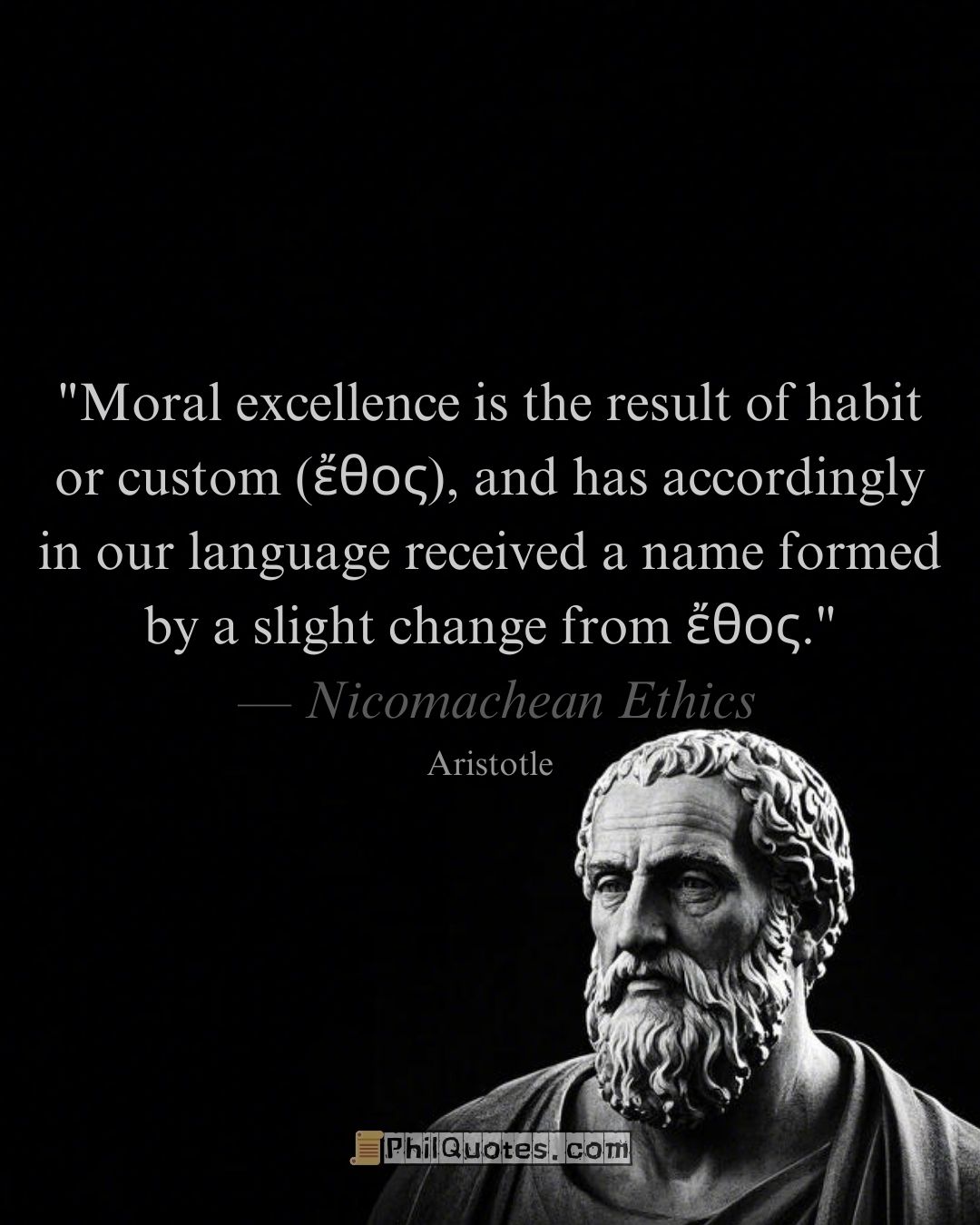Have you ever wondered how to become a better person—or what it even means to live a ”good life”? Over 2,000 years ago, the ancient Greek philosopher Aristotle asked these same questions, and his answers still inspire us today. In his famous book Nicomachean Ethics, Aristotle explains that virtues like courage, honesty, and kindness aren’t just things you’re born with—they’re skills you develop through practice, like learning to play an instrument or shoot hoops. Think of it this way: If you want to get stronger, you hit the gym. If you want to build good habits, you act on them daily. Aristotle’s big idea? “We become just by doing just acts,” and every small choice shapes who we are.
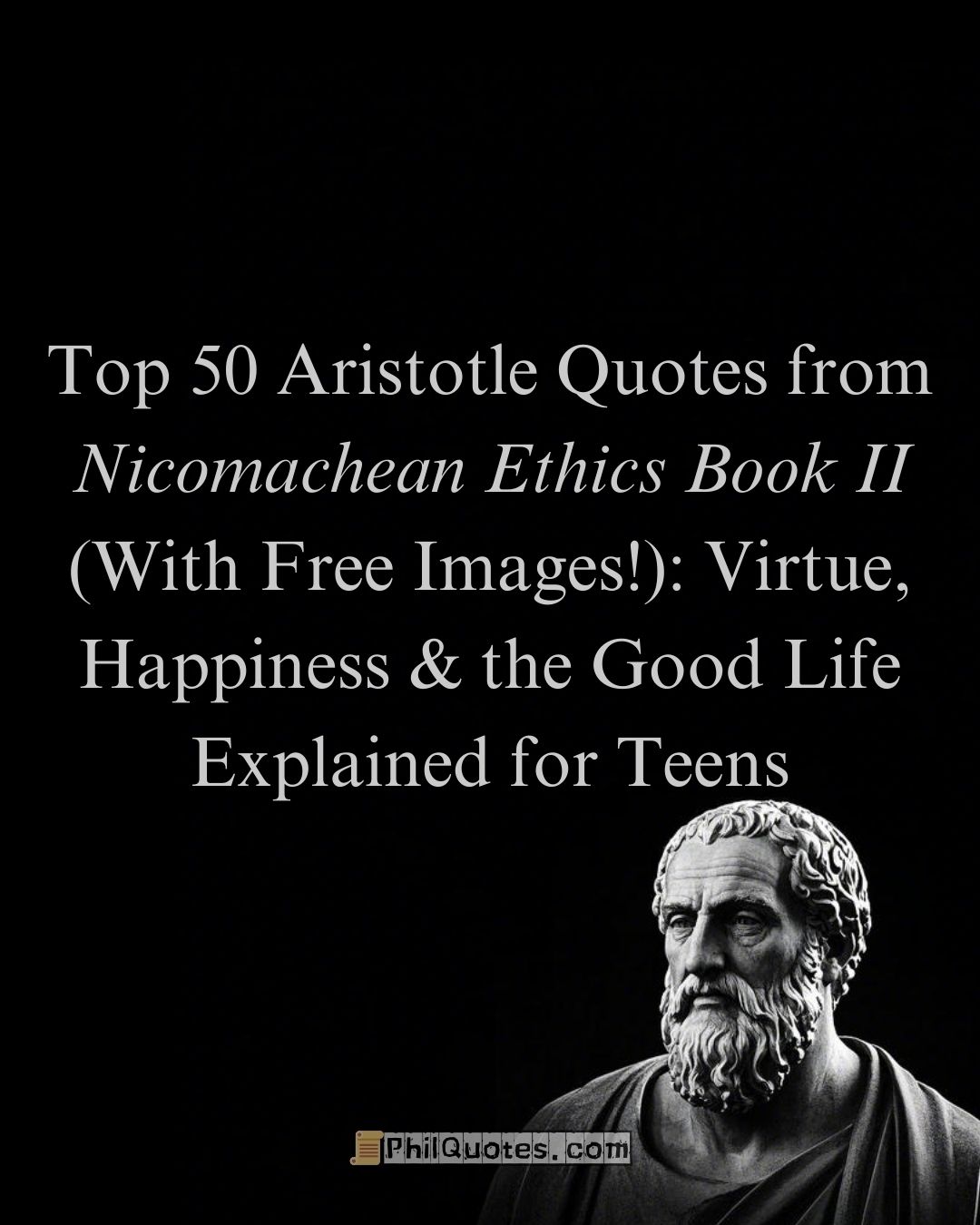
Here at PhilQuotes.com, we’ve made Aristotle’s wisdom easy to explore—and fun to share! Below, you’ll find 50 powerful quotes from Nicomachean Ethics Book II, where Aristotle breaks down how virtues work, why moderation is key (no, he’s not talking about boring compromises!), and how to avoid the pitfalls of extremes. Each quote comes with a clickable link to a vibrant image and a simple explanation, perfect for saving, sharing, or even printing as a daily reminder. Whether you’re working on a school project, curious about philosophy, or just want to level up your life, these quotes are your step-by-step guide to Aristotle’s “golden mean”—the sweet spot between too much and too little.
Why does this matter now? Because Aristotle’s lessons aren’t dusty old ideas. They’re tools for navigating social media drama, peer pressure, or even stress about grades. Click through to discover why courage isn’t about being fearless, how friendship is like a muscle, and why happiness is an action, not a trophy. And don’t forget to share your favorite quotes with friends—philosophy is better when you talk about it!
- “Moral excellence is the result of habit or custom (ἔθος), and has accordingly in our language received a name formed by a slight change from ἔθος.”
— Aristotle, Nicomachean Ethics, Book II, Chapter 1
(Translated by W.D. Ross)
- “None of the moral excellences or virtues is implanted in us by nature; for that which is by nature cannot be altered by training.”
— Aristotle, Nicomachean Ethics, Book II, Chapter 1
(Translated by W.D. Ross)
- “The virtues come neither by nature nor against nature, but nature gives the capacity for acquiring them, and this is developed by training.”
— Aristotle, Nicomachean Ethics, Book II, Chapter 1
(Translated by W.D. Ross)
- “By doing just acts we become just, and by doing acts of temperance and courage we become temperate and courageous.”
— Aristotle, Nicomachean Ethics, Book II, Chapter 1
(Translated by W.D. Ross)
- “Acts of any kind produce habits or characters of the same kind.”
— Aristotle, Nicomachean Ethics, Book II, Chapter 1
(Translated by W.D. Ross)
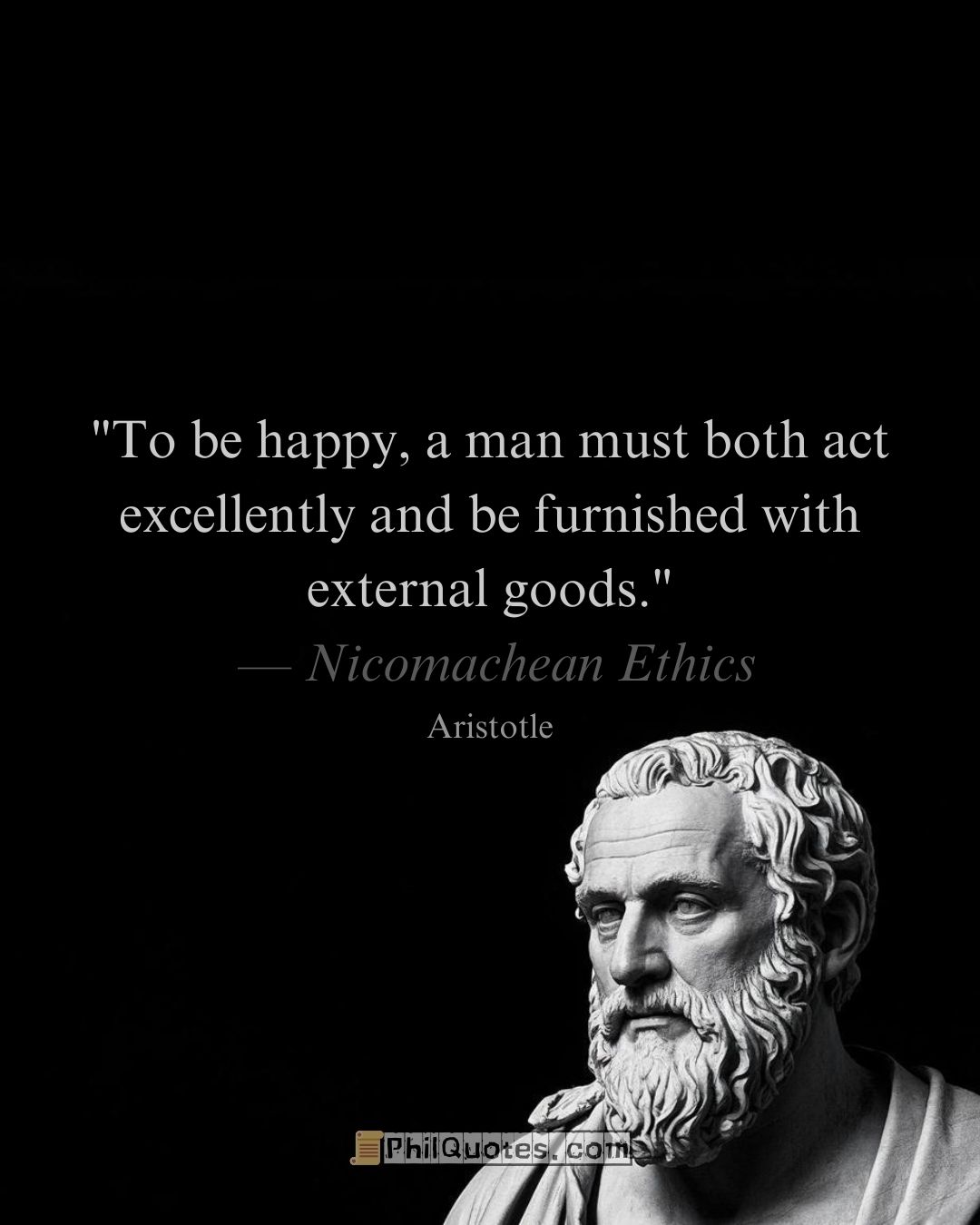
- “To be happy, a man must both act excellently and be furnished with external goods.”
— Aristotle, Nicomachean Ethics, Book II, Chapter 1
(Translated by W.D. Ross)
- “Virtue requires both natural capacity and deliberate practice.”
— Aristotle, Nicomachean Ethics, Book II, Chapter 1
(Translated by W.D. Ross)
- “The end of medicine is health; of shipbuilding, a vessel; of strategy, victory.”
— Aristotle, Nicomachean Ethics, Book II, Chapter 1
(Translated by W.D. Ross)
- “The good man’s life is pleasant in itself, for pleasure is a natural accompaniment of noble acts.”
— Aristotle, Nicomachean Ethics, Book II, Chapter 1
(Translated by W.D. Ross)
- “Happiness is activity in accordance with virtue, and this activity is its own reward.”
— Aristotle, Nicomachean Ethics, Book II, Chapter 1
(Translated by W.D. Ross)
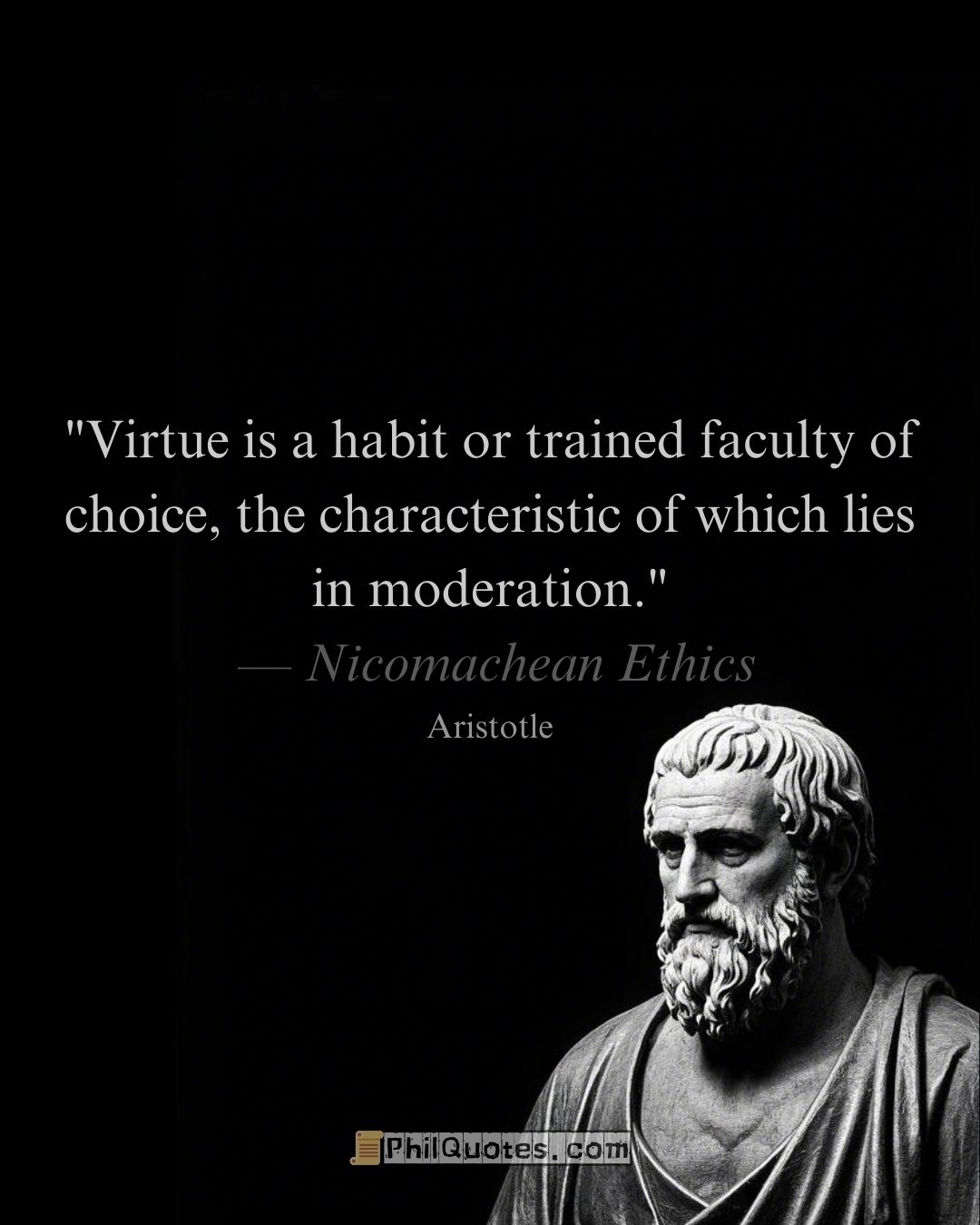
- “Virtue is a habit or trained faculty of choice, the characteristic of which lies in moderation.”
— Aristotle, Nicomachean Ethics, Book II, Chapter 6
(Translated by W.D. Ross)
- “Excellence is a mean state between excess and deficiency.”
— Aristotle, Nicomachean Ethics, Book II, Chapter 6
(Translated by W.D. Ross)
- “To face danger with pleasure, or at any rate without pain, is courageous.”
— Aristotle, Nicomachean Ethics, Book II, Chapter 3
(Translated by W.D. Ross)
- “The pleasure or pain that accompanies the acts must be taken as a test of the formed habit.”
— Aristotle, Nicomachean Ethics, Book II, Chapter 3
(Translated by W.D. Ross)
- “Virtue is concerned with pleasures and pains; the acts which produce it develop it, and when differently done, destroy it.”
— Aristotle, Nicomachean Ethics, Book II, Chapter 3
(Translated by W.D. Ross)
- “Virtue, then, is a habit or trained faculty of choice, the characteristic of which lies in moderation or observance of the mean.”
— Aristotle, Nicomachean Ethics, Book II, Chapter 6
(Translated by W.D. Ross)
- “Excellence is a mean state between excess and deficiency, determined by the right reason and as the prudent man would determine it.”
— Aristotle, Nicomachean Ethics, Book II, Chapter 6
(Translated by W.D. Ross)
- “Virtue is more exact and better than any art, for it aims at the mean in passions and actions.”
— Aristotle, Nicomachean Ethics, Book II, Chapter 6
(Translated by W.D. Ross)
- “To feel fear, confidence, desire, anger, or pity at the right time, toward the right objects, and in the right manner—this is the mean and the best course.”
— Aristotle, Nicomachean Ethics, Book II, Chapter 6
(Translated by W.D. Ross)
- “Evil is infinite in nature, while good is finite; hence it is easy to miss the mark and hard to hit it.”
— Aristotle, Nicomachean Ethics, Book II, Chapter 6
(Translated by W.D. Ross)
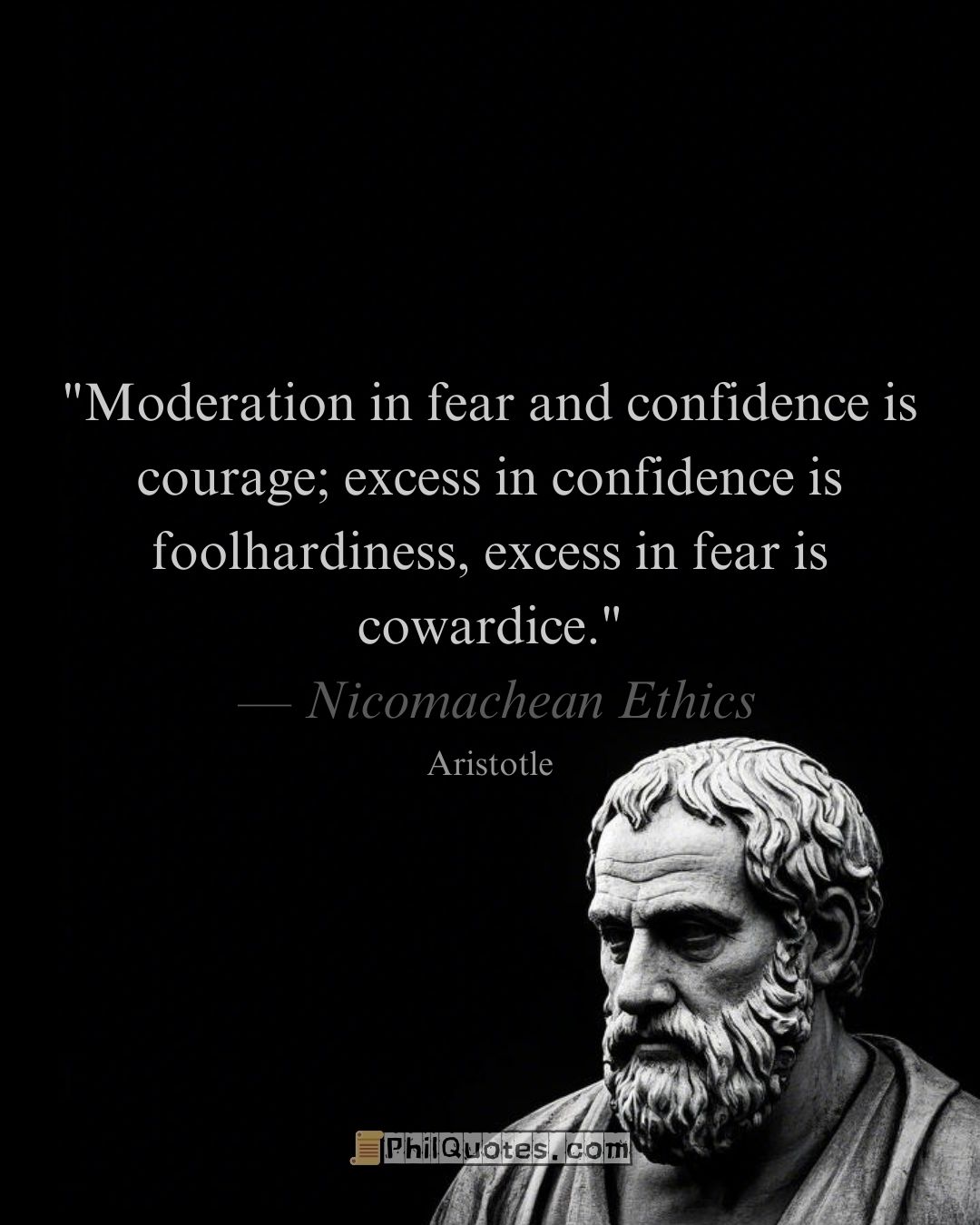
- “Moderation in fear and confidence is courage; excess in confidence is foolhardiness, excess in fear is cowardice.”
— Aristotle, Nicomachean Ethics, Book II, Chapter 7
(Translated by W.D. Ross)
- “Temperance is moderation in bodily pleasures; excess is profligacy, deficiency is insensibility.”
— Aristotle, Nicomachean Ethics, Book II, Chapter 7
(Translated by W.D. Ross)
- “Liberality is moderation in giving and taking wealth; excess is prodigality, deficiency is illiberality.”
— Aristotle, Nicomachean Ethics, Book II, Chapter 7
(Translated by W.D. Ross)
- “Magnificence is moderation in large expenditures; excess is vulgarity, deficiency is meanness.”
— Aristotle, Nicomachean Ethics, Book II, Chapter 7
(Translated by W.D. Ross)
- “High-mindedness is moderation in honour; excess is vanity, deficiency is little-mindedness.”
— Aristotle, Nicomachean Ethics, Book II, Chapter 7
(Translated by W.D. Ross)
- “Gentleness is moderation in anger; excess is irascibility, deficiency is apathy.”
— Aristotle, Nicomachean Ethics, Book II, Chapter 7
(Translated by W.D. Ross)
- “Truthfulness is moderation in speech; excess is boastfulness, deficiency is self-deprecation.”
— Aristotle, Nicomachean Ethics, Book II, Chapter 7
(Translated by W.D. Ross)
- “Wittiness is moderation in amusement; excess is buffoonery, deficiency is boorishness.”
— Aristotle, Nicomachean Ethics, Book II, Chapter 7
(Translated by W.D. Ross)
- “Friendliness is moderation in social conduct; excess is obsequiousness, deficiency is quarrelsomeness.”
— Aristotle, Nicomachean Ethics, Book II, Chapter 7
(Translated by W.D. Ross)
- “Modesty is not a virtue, but the modest man is praised for moderation in shame.”
— Aristotle, Nicomachean Ethics, Book II, Chapter 7
(Translated by W.D. Ross)

- “Righteous indignation is a mean between envy and spite; it feels pain at undeserved good fortune.”
— Aristotle, Nicomachean Ethics, Book II, Chapter 7
(Translated by W.D. Ross)
- “The extremes are more opposed to each other than to the mean, as cowardice and foolhardiness are both contrary to courage.”
— Aristotle, Nicomachean Ethics, Book II, Chapter 8
(Translated by W.D. Ross)
- “One extreme is closer to the mean than the other; foolhardiness resembles courage more than cowardice does.”
— Aristotle, Nicomachean Ethics, Book II, Chapter 8
(Translated by W.D. Ross)
- “We must bend ourselves away from our natural inclinations to attain the mean, as a crooked stick is straightened.”
— Aristotle, Nicomachean Ethics, Book II, Chapter 9
(Translated by W.D. Ross)
- “To hit the mean is hard, especially in particulars; for perception, not reason, must judge each case.”
— Aristotle, Nicomachean Ethics, Book II, Chapter 9
(Translated by W.D. Ross)
- “Virtue is destroyed by excess and deficiency but preserved by the mean, as health is by moderate diet.”
— Aristotle, Nicomachean Ethics, Book II, Chapter 2
(Translated by W.D. Ross)
- “The legislator makes citizens good by habituating them to virtuous acts.”
— Aristotle, Nicomachean Ethics, Book II, Chapter 1
(Translated by W.D. Ross)
- “Moral virtue is formed by habit, as a harpist becomes skilled by harping.”
— Aristotle, Nicomachean Ethics, Book II, Chapter 1
(Translated by W.D. Ross)
- “Virtue and vice are voluntary; we become unjust by choosing unjust acts.”
— Aristotle, Nicomachean Ethics, Book II, Chapter 5
(Translated by W.D. Ross)
- “Virtue requires knowledge, choice, and a stable character; mere action is insufficient.”
— Aristotle, Nicomachean Ethics, Book II, Chapter 4
(Translated by W.D. Ross)
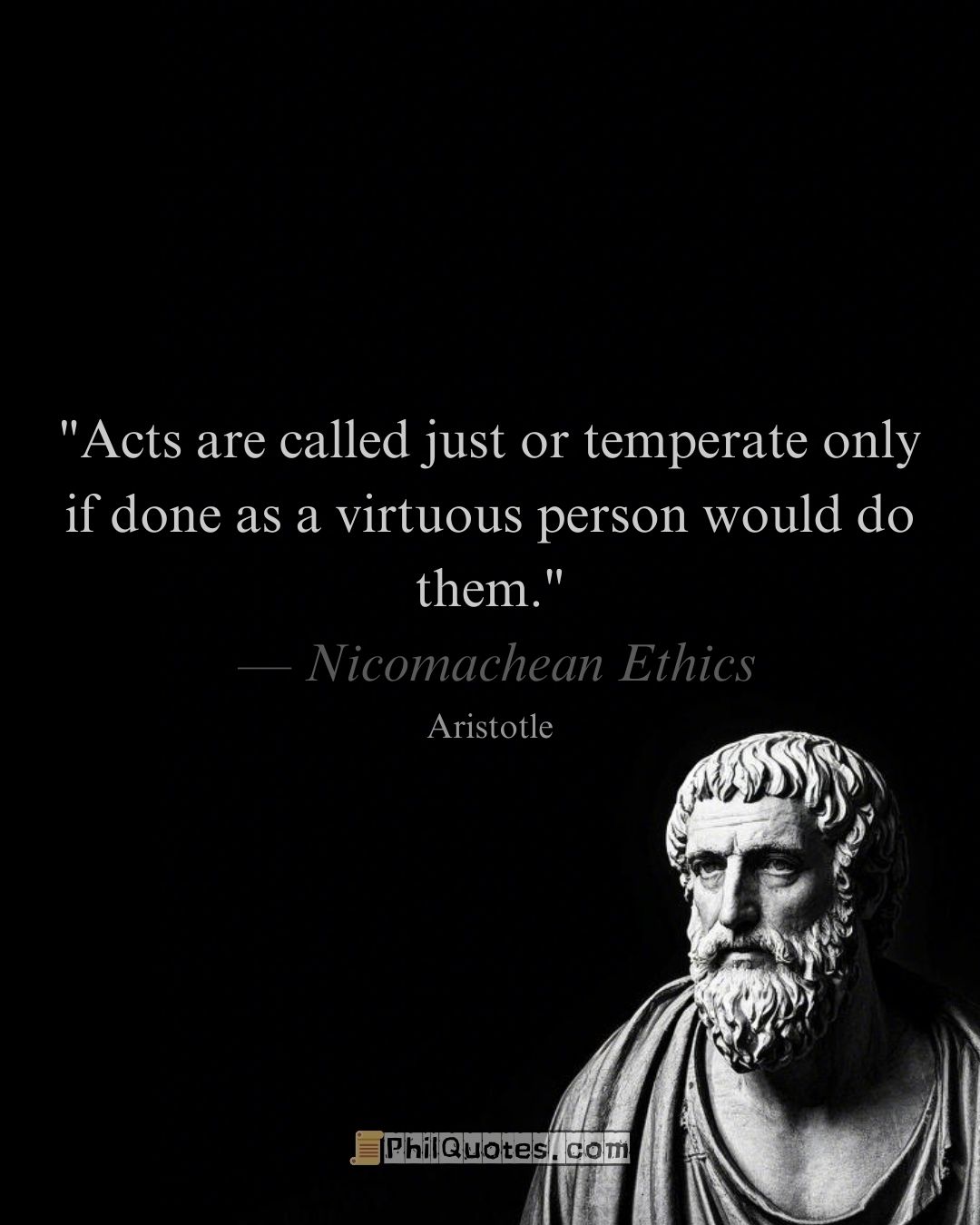
- “Acts are called just or temperate only if done as a virtuous person would do them.”
— Aristotle, Nicomachean Ethics, Book II, Chapter 4
(Translated by W.D. Ross)
- “Virtue is a state of character concerned with choice, lying in the mean relative to us.”
— Aristotle, Nicomachean Ethics, Book II, Chapter 6
(Translated by W.D. Ross)
- “The mean in each virtue is determined not absolutely, but relative to the individual.”
— Aristotle, Nicomachean Ethics, Book II, Chapter 6
(Translated by W.D. Ross)
- “To err slightly in the mean is blameless, but large deviations are vicious.”
— Aristotle, Nicomachean Ethics, Book II, Chapter 9
(Translated by W.D. Ross)
- “We must sometimes lean toward excess or deficiency to hit the mean, as a crooked stick is straightened.”
— Aristotle, Nicomachean Ethics, Book II, Chapter 9
(Translated by W.D. Ross)
- “Pleasure and pain test our habits; the temperate rejoice in abstinence, the profligate resent it.”
— Aristotle, Nicomachean Ethics, Book II, Chapter 3
(Translated by W.D. Ross)
- “Education should train the youth to feel pleasure and pain in the right objects.”
— Aristotle, Nicomachean Ethics, Book II, Chapter 3
(Translated by W.D. Ross)
- “Virtues are destroyed by excess and deficiency but preserved by the mean, as strength is by moderate exercise.”
— Aristotle, Nicomachean Ethics, Book II, Chapter 2
(Translated by W.D. Ross)
- “The mean in virtue is not a mathematical midpoint but what is right for the individual.”
— Aristotle, Nicomachean Ethics, Book II, Chapter 6
(Translated by W.D. Ross)
- “Virtue is a middle state between two vices, aiming at what is best and right.”
— Aristotle, Nicomachean Ethics, Book II, Chapter 6
(Translated by W.D. Ross)
Exploring Aristotle’s Nicomachean Ethics might feel like time-traveling to ancient Greece, but his advice is as fresh as your latest TikTok feed. From courage to kindness, every quote you’ve clicked through today is a reminder: You’re not stuck with the habits you have now. Want to be more confident? Start by acting confidently. Want better friendships? Practice being a good friend. Aristotle’s “golden mean” isn’t about perfection—it’s about progress, one small choice at a time.
At PhilQuotes.com, we’re all about making philosophy accessible, visual, and shareable. Bookmark this page to revisit your favorite quotes (like #23 on why “modesty isn’t a virtue” or #37 on how anger can be healthy), or dive into our other collections on Stoicism, leadership, and mindfulness. Each quote image is designed to pop on Instagram, Pinterest, or your group chats—because great ideas deserve to go viral!
Still curious? Aristotle would tell you that learning doesn’t stop here. Follow us on [social media handle] for daily wisdom bites, or explore our [interactive quizzes/podcasts] to test your knowledge. And remember: The next time you’re stuck between a tough choice, ask yourself, “What’s the middle path?” Share this article with a friend who needs a mindset boost, and keep practicing those virtues. After all, as Aristotle says, “Excellence is a habit.”
Ready for more? Click through any quote above to save its image, or browse PhilQuotes.com to unlock your inner philosopher—one inspiring post at a time. 🌟
